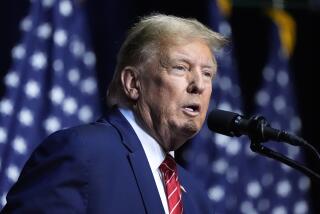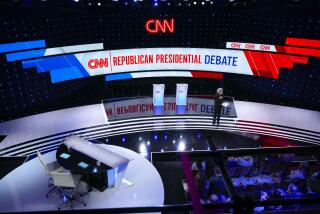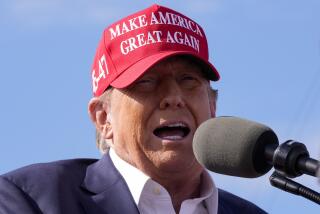Money race for 2016 already underway
PARK CITY, Utah — The field for the 2016 presidential race has yet to take shape, but over private dinners and meetings, and at an intimate retreat this week hosted by 2012 GOP nominee Mitt Romney, the underground money race on the Republican side has begun.
For potential contenders such as Wisconsin Rep. Paul D. Ryan, New Jersey Gov. Chris Christie, Kentucky Sen. Rand Paul and Florida Sen. Marco Rubio, the money courtship at this stage is a dance: a series of meetings where donors take their measure, while the contenders, in part because of campaign finance laws, talk broadly about their agendas while demurring on the question of whether they will run.
But campaign strategists and finance officials note that early meetings, like the ones that begin Wednesday in Park City, are crucial in creating a kinship with potential financiers, while assessing the candidates’ aptitude for raising money and establishing viability.
“Presidential politics are like icebergs, and at this stage of the race, 95% of the mass of the iceberg is below the water line,” said strategist Steve Schmidt, who helped run the campaign of 2008 Republican nominee John McCain.
In this phase, potential contenders are “lining up donors, lining up talent and doing politics,” said Stephanie Cutter, a strategist for President Obama and 2004 Democratic presidential nominee John F. Kerry. In initial meetings with donors, like the ones in Park City, the candidates’ imperatives are to explain their records and positions on key issues and to demonstrate that they have the ability to “build and run an organization like a presidential campaign, and have a chance to actually win,” Cutter said.
“Laying out what your pathway is is critical,” she said.
Though many voters might groan at the thought of another presidential race so soon after the November election, the advent of the $1-billion campaign and the reluctance on both sides of the aisle to accept federal matching funds has accelerated the planning schedule for any potential candidates.
“You talk about the sheer quantity of the dollars that you have to raise — you can’t do that just by getting through the primary and expecting all of that to come,” said Spencer Zwick, who led Romney’s 2008 and 2012 finance operations.
Zwick, who organized the Park City gathering along with longtime Romney advisor Beth Myers, said Romney believed it was important to give all the potential contenders access to his finance network, which raised more than any other GOP operation in history. Paul, Christie and Ryan plan to attend.
At this point in the 2012 cycle, Zwick said, he was already building a leadership team. If he was working for a potential 2016 candidate, he said, he already would be making sure that his candidate was “getting a lot of exposure to people we could count on — not just to write checks, because that’s a large number of people, but the people who you think could take responsibility for a specific geography, meaning a state, or a vertical, like an industry, and begin to organize around that.”
“The people that are going to do the lion’s share of the work, they want to have a relationship,” Zwick said.
Romney had advantages in 2012 that none of the 2016 Republican contenders may have — the experience of running his 2008 campaign and having built relationships and a national network capable of sustaining those donors over time.
Republicans are also facing the possibility that their next nominee will be up against the powerful organization of Democrat Hillary Rodham Clinton, who raised substantial sums in her 2008 campaign and is married to one of the most successful Democratic fundraisers in history. (The former secretary of State has not decided whether to run, but her entry could essentially clear the field on the Democratic side.)
At the “Experts and Enthusiasts” conference this week at the posh Stein Eriksen Lodge, donors will have the chance, in between panels with leaders like Hewlett-Packard Chief Executive Meg Whitman and Obama strategist David Axelrod, to mingle with the prospective candidates at the shooting range or on the golf course.
Like Florida’s Jeb Bush, the most notable absentee this week, Christie already has a national profile and extensive fundraising networks from his gubernatorial bids. Some of the lesser-known candidates on both sides of the aisle are working quickly to build their networks across the country.
Louisiana Gov. Bobby Jindal, a Republican, and Maryland’s Democratic Gov. Martin O’Malley have been able to meet donors nationwide by leading their parties’ governors associations. Ryan, who made the rounds to several of Romney’s top New York donors last week, made many connections in Romney’s network by raising money as his running mate last year.
Serious contenders who have signaled an interest in running will be guided by an element of pragmatism, said Schmidt: “The question is whether there is a requisite amount of support, financial and otherwise, to run a credible campaign. …They are measuring whether there is enough oxygen in the air to support a run.”
Clinton’s potential presence has made other potential Democratic candidates wary of looking too eager — sparing them the embarrassment of stepping aside if she announces a run. But in a sign of the complexities of the fundraising landscape, an adjunct team is already springing up around her to continue boosting her profile in the 2014 election cycle.
Last week, the “Ready for Hillary” political action committee — which was formed by supporters and granted political legitimacy when longtime Bill Clinton operatives Harold Ickes and James Carville joined the team — announced its national finance council, with leaders that include Esprit founder and San Francisco philanthropist Susie Tompkins Buell and Steve and Amber Mostyn of Houston, who were among the largest contributors to a pro-Obama “super PAC” last year.
Outside groups such as Emily’s List, which has made no secret of its hopes for a Clinton candidacy, are keeping their donors energized through local and state races as they look ahead to 2016.
More to Read
Start your day right
Sign up for Essential California for news, features and recommendations from the L.A. Times and beyond in your inbox six days a week.
You may occasionally receive promotional content from the Los Angeles Times.







